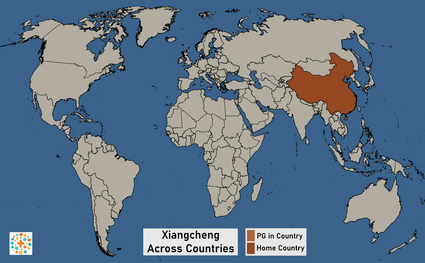The government has not recognized the Xiangcheng as an independent minority but has included them as part of the Tibetan nationality. "The Xiangcheng people identify themselves as the descendants of Tibetan, Naxi, and Subi people. ... In his southern expedition, Kublai Khan of the Yuan Dynasty (1271-1368) brought a great number of Subi people of Mongolian origin here to settle down in Xiangcheng. Ruins of ancient castles can still be found here."
For centuries the Xiangcheng area has remained virtually untouched - a remote outpost along the ancient caravan route that linked Yunnan with Tibet and Sichuan. One writer has noted, "Xiangcheng's geographic location provides a unique strategic location, which perhaps has also nurtured the firm character of the Xiangcheng people. Xiangcheng controls Zhongdian to the south, defends the ancient Yunnan-Tibet route in the west, and blocks the Sichuan-Tibet route from Batang to Dajianlu [now Kangding]. Since ancient times Xiangcheng has been contested by all strategists." When Joseph Rock visited in 1930, he found the Xiangcheng territory was ruled by Sashatimba, a bandit chief based at the Sangpiliang Monastery. "Other bandit chiefs assist Sashatimba to rule the land. Together they loot and rob and murder. They even go on journeys of many weeks to hold up caravans or loot peaceful settlements. No Chinese dares to enter the Hsiangcheng [Xiangcheng] territories."
The Xiangcheng build beautiful houses, which have white rocks on the roofs like those of the Qiang people. Xiangcheng homes are square-shaped, two stories, with colorful decorations around the window frames. They are very different from the houses of their neighbors, the Khampa.
The Xiangcheng are zealous believers in Tibetan Buddhism. Their beliefs form a large part of their identity as a people. There are numerous Buddhist temples and pagodas throughout the region.
The Xiangcheng are one of the most untouched people groups in China. Few if any have heard of Jesus Christ. There are no Christian communities in the region and no gospel literature or recordings in their language. There has been no history of missionary work in the vicinity of this hidden location.
The Xiangcheng people need to put their trust and identity in the hands of the loving God of Creation who sent his son to make it possible for them to enter the Kingdom of God.
Pray for the spiritual blindness and bondage to the evil one to be removed so they can understand and respond to Christ.
Pray for the Lord to provide for their physical and spiritual needs as a testimony of his power and love.
Pray the Xiangcheng people will have a spiritual hunger that will open their hearts to the King of kings.
Pray for an unstoppable movement to Christ among them.
Scripture Prayers for the Xiangcheng in China.
Operation China, Asia Harvest, Copyrighted © Used with permission
| Profile Source: Joshua Project |











